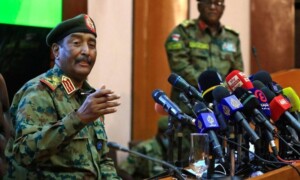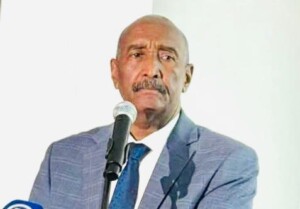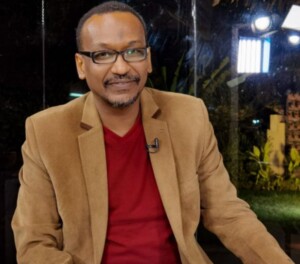Sudanese opposition welcomes AU communiqué
The Sudan Appeal opposition coalition welcomed the decision of the AU Peace and Security Council (AUSCP) in its 359th meeting on 25 August. They consider it a firm base for further negotiations with the Sudanese government.
Yasir Arman, the secretary-general of the Sudan People’s Liberation Movement-North (SPLM-N) and foreign relations secretary of the Sudan Revolutionary Front (SRF) rebel alliance described the outcome of the 359th AUPSC meeting as “a historic decision, after President Al Bashir tried to turn the table on all internal and external parties”.
The Sudan Appeal opposition coalition welcomed the decision of the AU Peace and Security Council (AUPSC) in its 359th meeting on 25 August. They consider it a firm base for further negotiations with the Sudanese government.
Yasir Arman, the secretary-general of the Sudan People’s Liberation Movement-North (SPLM-N) and foreign relations secretary of the Sudan Revolutionary Front (SRF) rebel alliance described the outcome of the 539th AUPSC meeting as “a historic decision, after President Al Bashir tried to turn the table on all internal and external parties”.
On Tuesday, the AU Council released a communiqué in which it repeated the importance of a holistic approach to solve the multiple crises in Sudan and realise a democratic transformation.
The AUPSC called upon the Sudanese government to desist from any actions that would jeopardise a credible and all-inclusive National Dialogue within Sudan, and reiterated its call for an urgent pre-dialogue meeting of all relevant parties at the AU Headquarters in Addis Ababa, to discuss and agree on procedural matters.
Arman told Radio Dabanga on Wednesday that the Council’s decision “put an end to Al Bashir and his party’s unilateral control of the peace process and the national constitutional dialogue. The door has now been shut for the ruling National Congress Party (NCP) to play the role of prosecutor and judge at the same time”.
He welcomed the Council’s road map that prioritises the ending of the wars and the delivery of humanitarian relief to the affected “through a direct dialogue between the parties to the conflict.
“The AUPSC tasked the chairman of the AU High-level Implementation Panel (AUHIP) Thabo Mbeki to meet with all serious parties to the National Dialogue to discuss the requirements for such a dialogue set out by the AU. These include ending the wars, the delivery of aid, the restoration of civic freedoms in the country, and clear and transparent procedures for the Dialogue preparatory meeting.”
‘Firm base’
According to Minni Minawi, leader of the Sudan Liberation Movement-MM, and SRF co-vice-president, the AUPSC’s decision constitutes “a firm base for changing the situation in Sudan in general and Darfur and the Two Areas (South Kordofan and Blue Nile states) in particular”.
He told Radio Dabanga that the AU has now committed the Sudanese government to stop the wars in Darfur and the Two Areas within 90 days. “We welcome this decision and will immediately discuss the new situation with the opposition political forces, especially those in Darfur.
“The AUPSC meeting also strengthened AUHIP’s mandate by explicitly tasking the team with the peace negotiations between the Sudanese Government and the armed opposition.”
Minawi said that the AUPSC decision “has completely blown up the Doha Document for Peace in Darfur.”
The rebel leader told “all the people affected by the wars in Sudan that we are serious about putting your demands on the dialogue table. It would be great if the other party is willing to negotiate, otherwise it should be prepared for a confrontation with the international community”.
Alternative dialogue
In a meeting held in Addis Ababa on Tuesday evening, the Sudan Appeal signatories and representatives of the political parties that withdrew from the 7+7 National Dialogue steering committee, considered the ongoing National Dialogue in Khartoum as “truncated”.
In a joint statement on Wednesday, the parties stressed that the current National Dialogue process is “non-inclusive and will not lead to the solution of the problems in the country”.
They agreed to launch an alternative dialogue “that will not exclude any category of the Sudanese community” in the event the Sudanese government adheres to the process without adjusting the requirements.
Stalemate
Earlier this year, the AUHIP chairman attempted to break the deadlock over the negotiations between Khartoum and the Sudanese rebel movements. He invited them to Addis Ababa on 29 March to discuss the merger of the peace talks on Darfur and the Two Areas with a broad national dialogue. The NCP declined to attend at the last minute.
The AUHIP team invited the opposition forces to Addis Ababa over the weekend for consultations about the current stalemate. Al Bashir told Mbeki in the first week of August that he is determined to move forward with the dialogue, with or without participation of the opposition forces. He was willing to agree to a ceasefire for the Two Areas. As for Darfur, he maintained his stance that the holdout rebel movements should join the 2011 Doha Document for Peace in Darfur (DDPD).
The SRF, the National Umma Party, the National Consensus Forces (NCF, a coalition of opposition parties) and the Civil Society Initiative (CSI) signed the Sudan Appeal, a two-page communiqué calling for regime-change, in the Ethiopian capital on 3 December last year.
Last Wednesday, the CSI called for the strengthening of the AUHIP mediation team and the addition of international partners to be able to support a “final and comprehensive solution to the multiple crises in Sudan”.
Ceasefire
In his address to the National Dialogue general assembly last Thursday evening, President Al Bashir announced a two-month ceasefire in the Sudanese conflict regions in a bid to smooth the climate for an all-inclusive dialogue. He however denied the presence of political detainees in Sudan.
The ceasefire became effective on Monday.











 and then
and then